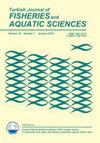Drying and Rehydration Characteristics of Microwave Dried Mytilus edulis
IF 1.7
4区 农林科学
Q3 FISHERIES
引用次数: 0
Abstract
Rehydration is a critical factor in the processing and consumption of dried food products. This study investigated the kinetics of microwave drying and rehydration of blue mussels (Mytilus edulis) in the range of 140 - 350 W power levels and 20 - 40°C temperatures, respectively. The drying data were utilized to calculate effective diffusivity coefficients (Deff) and activation energy (EA), while rehydration rates and time were also determined. Mathematical modeling was employed to describe the drying and rehydration processes, and the performance of different models was evaluated. The drying process took between 13 - 4.5 minutes, while rehydration was concluded within 360 - 480 minutes. The Deff values ranged from 1.22 - 3.91×10-7 m2/s, and the EA was calculated as 11.417 kW/kg. Rehydration rates resulted in 0.000061 - 0.000126 g/g×min at the highest 40°C and 0.000018 - 0.000032 g/g×min at the lowest 20°C. The drying and rehydration processes were best described by the Alibas model among 11 models and the Two-Term Exponential model among 2 models, respectively. Overall, this study aims to provide valuable insights into the kinetics of microwave drying and rehydration of blue mussels, which can help optimize the processing and preservation of dried food products before consumption.微波干燥贻贝的干燥和复水特性
脱水是干食品加工和消费的一个关键因素。本研究分别在140-350 W功率水平和20-40°C温度范围内研究了蓝贻贝(Mytilus edulis)的微波干燥和再水合动力学。干燥数据用于计算有效扩散系数(Deff)和活化能(EA),同时还确定了再水合速率和时间。采用数学模型描述了干燥和再水合过程,并对不同模型的性能进行了评估。干燥过程需要13-4.5分钟,而再水化在360-480分钟内完成。Deff值范围为1.22-3.91×10-7m2/s,EA计算为11.417 kW/kg。在最高40°C时,再水合速率为0.000061-0.000126 g/g×min,在最低20°C时为0.000018-0.000032 g/g×min。在11个模型中,Alibas模型和2个模型中的二项指数模型分别对干燥和再水合过程进行了最佳描述。总的来说,这项研究旨在为蓝贻贝的微波干燥和再水合动力学提供有价值的见解,这有助于优化干燥食品在食用前的加工和保存。
本文章由计算机程序翻译,如有差异,请以英文原文为准。
求助全文
约1分钟内获得全文
求助全文
来源期刊

Turkish Journal of Fisheries and Aquatic Sciences
FISHERIES-MARINE & FRESHWATER BIOLOGY
CiteScore
3.10
自引率
0.00%
发文量
43
审稿时长
3 months
期刊介绍:
Turkish Journal of Fisheries and Aquatic Sciences" (TrJFAS) is a refereed academic journal has been published by Central Fisheries Research Institute of Turkey and Japan International Cooperation Agency (JICA), and published in English.
It aims to address research and needs of all working and studying within the many varied areas of fisheries and aquatic sciences.
The Journal publishes English language original research papers, critical review articles, short communications and technical notes on applied or scientific research relevant to freshwater, brackish and marine environments.
TrJFAS was published biannually (April & November) between 2001 and 2009. A great number of manuscripts have been submitted to the journal for review from acceptance of the SCI index. Thereby, the journal has been published quarterly (March, June, September and December) from 2010 to 2017. The journal will be published monthly in 2018.
 求助内容:
求助内容: 应助结果提醒方式:
应助结果提醒方式:


